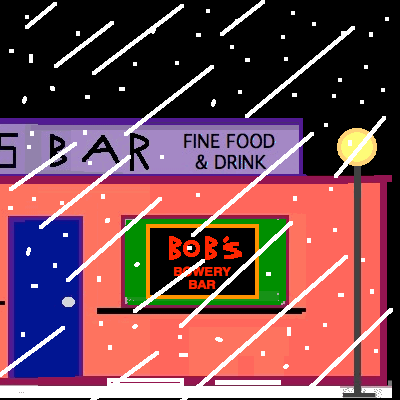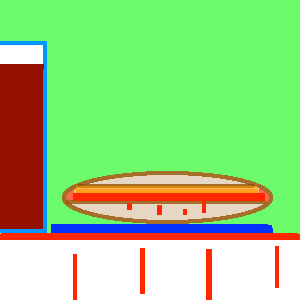

The first effort of his pen in 1775 was, 'Proposals for publishing the Works of Mrs. Charlotte Lennox,' in three volumes quarto. In his diary, January 2, I find this entry: 'Wrote Charlotte's Proposals.' But, indeed, the internal evidence would have been quite sufficient. Her claim to the favour of the public was thus enforced:—
'Most of the pieces, as they appeared singly, have been read with approbation, perhaps above their merits, but of no great advantage to the writer. She hopes, therefore, that she shall not be considered as too indulgent to vanity, or too studious of interest, if, from that labour which has hitherto been chiefly gainful to others, she endeavours to obtain at last some profit for herself and her children. She cannot decently enforce her claim by the praise of her own performances; nor can she suppose, that, by the most artful and laboured address, any additional notice could be procured to a publication, of which Her MAJESTY has condescended to be the PATRONESS.'
He this year also wrote the Preface to Baretti's Easy Lessons in Italian and English.
'To JAMES BOSWELL, ESQ.
'DEAR SIR,
'You never did ask for a book by the post till now, and I did not think on it. You see now it is done. I sent one to the King, and I hear he likes it.
'I shall send a parcel into Scotland for presents, and intend to give to many of my friends.
'Let me know, as fast as you read it, how you like it; and let me know if any mistake is committed, or any thing important left out. I wish you could have seen the sheets. My compliments to Mrs. Boswell, and to Veronica, and to all my friends.
'I am, Sir,
'Your most humble servant,
'SAM. JOHNSON.'
'January 14, 1775.
'MR. BOSWELL TO DR. JOHNSON.
'Edinburgh, Jan. 19, 1775.
'Be pleased to accept of my best thanks for your Journey to the Hebrides, which came to me by last night's post. I did really ask the favour twice; but you have been even with me by granting it so speedily. Bis dat qui cito dat [“he gives twice who gives promptly” – Editor]. Though ill of a bad cold, you kept me up the greatest part of the last night; for I did not stop till I had read every word of your book. I looked back to our first talking of a visit to the Hebrides, which was many years ago, when sitting by ourselves in the Mitre tavern, in London, I think about witching time o' night; and then exulted in contemplating our scheme fulfilled, and a monumentum perenne [“enduring monument” – Ed.] of it erected by your superiour abilities. I shall only say, that your book has afforded me a high gratification. I shall afterwards give you my thoughts on particular passages.
In the mean time, I hasten to tell you of your having mistaken two names, which you will correct in London, as I shall do here, that the gentlemen who deserve the valuable compliments which you have paid them, may enjoy their honours. In page 106, for Gordon read Murchison; and in page 357, for Maclean read Macleod.
'TO JAMES BOSWELL, ESQ.
'DEAR SIR,
'I long to hear how you like the book; it is, I think, much liked here. But Macpherson is very furious; can you give me any more intelligence about him, or his Fingal? Do what you can and do it quickly. Is Lord Hailes on our side?
'I am going to write about the Americans. If you have picked up any hints among your lawyers, who are great masters of the law of nations, or if your own mind suggests any thing, let me know. But mum, it is a secret.
'I will send your parcel of books as soon as I can; but I cannot do as I wish. However, you find every thing mentioned in the book which you recommended.
'Langton is here; we are all that ever we were. He is a worthy fellow, without malice, though not without resentment.
'Poor Beauclerk is so ill, that his life is thought to be in danger. Lady Di nurses him with very great assiduity.
'Reynolds has taken too much to strong liquor, and seems to delight in his new character.
'This is all the news that I have; but as you love verses, I will send you a few which I made upon Inchkenneth; but remember the condition, you shall not show them, except to Lord Hailes, whom I love better than any man whom I know so little. If he asks you to transcribe them for him, you may do it, but I think he must promise not to let them be copied again, nor to show them as mine.
'Make my compliments to dear Mrs. Boswell, and to Miss Veronica.
'I am, dear Sir,
'Yours most faithfully,
'SAM. JOHNSON.'
'Jan. 21, 1775.
'MR. BOSWELL TO DR. JOHNSON.
'Edinburgh, Jan. 27, 1775.
* * * * *
'You rate our lawyers here too high, when you call them great masters of the law of nations.
* * * * *
'As for myself, I am ashamed to say I have read little and thought little on the subject of America. I will be much obliged to you, if you will direct me where I shall find the best information of what is to be said on both sides. It is a subject vast in its present extent and future consequences. The imperfect hints which now float in my mind, tend rather to the formation of an opinion that our government has been precipitant and severe in the resolutions taken against the Bostonians. Well do you know that I have no kindness for that race. But nations, or bodies of men, should, as well as individuals, have a fair trial, and not be condemned on character alone. Pray let me know immediately what to read, and I shall diligently endeavour to gather for you any thing that I can find.
Is Burke's speech on American taxation published by himself? Is it authentick? I remember to have heard you say, that you had never considered East-Indian affairs; though, surely, they are of much importance to Great-Britain. Under the recollection of this, I shelter myself from the reproach of ignorance about the Americans. If you write upon the subject I shall certainly understand it. But, since you seem to expect that I should know something of it, without your instruction, and that my own mind should suggest something, I trust you will put me in the way.
* * * * *
'What does Becket mean by the Originals of Fingal and other poems of Ossian, which he advertises to have lain in his shop?'
* * * * *
'MR. BOSWELL TO DR. JOHNSON.
'Edinburgh, Feb. 2, 1775
* * * * *
'As to Macpherson, I am anxious to have from yourself a full and pointed account of what has passed between you and him. It is confidently told here, that before your book came out he sent to you, to let you know that he understood you meant to deny the authenticity of Ossian's poems; that the originals were in his possession; that you might have inspection of them, and might take the evidence of people skilled in the Erse language; and that he hoped, after this fair offer, you would not be so uncandid as to assert that he had refused reasonable proof.
That you paid no regard to his message, but published your strong attack upon him; and then he wrote a letter to you, in such terms as he thought suited to one who had not acted as a man of veracity. You may believe it gives me pain to hear your conduct represented as unfavourable, while I can only deny what is said, on the ground that your character refutes it, without having any information to oppose. Let me, I beg it of you, be furnished with a sufficient answer to any calumny upon this occasion.
* * * * *
'To JAMES BOSWELL, ESQ.
'My DEAR BOSWELL,
'I am surprised that, knowing as you do the disposition of your countrymen to tell lies in favour of each other, you can be at all affected by any reports that circulate among them. Macpherson never in his life offered me a sight of any original or of any evidence of any kind; but thought only of intimidating me by noise and threats, till my last answer,— that I would not be deterred from detecting what I thought a cheat, by the menaces of a ruffian — put an end to our correspondence.
'The state of the question is this. He, and Dr. Blair, whom I consider as deceived, say, that he copied the poem from old manuscripts. His copies, if he had them, and I believe him to have none, are nothing. Where are the manuscripts? They can be shown if they exist, but they were never shown. No man has a claim to credit upon his own word, when better evidence, if he had it, may be easily produced.
But, so far as we can find, the Erse language was never written till very lately for the purposes of religion. A nation that cannot write, or a language that was never written, has no manuscripts.
'But whatever he has he never offered to show. If old manuscripts should now be mentioned, I should, unless there were more evidence than can be easily had, suppose them another proof of Scotch conspiracy in national falsehood.
'Do not censure the expression; you know it to be true.
'My compliments to Madam and Veronica.
'I am, Sir,
'Your most humble servant,
'SAM. JOHNSON.'
'February 7, 1775.'
What words were used by Mr. Macpherson in his letter to the venerable Sage, I have never heard; but they are generally said to have been of a nature very different from the language of literary contest. Dr. Johnson's answer appeared in the newspapers of the day, and has since been frequently re-published; but not with perfect accuracy. I give it as dictated to me by himself, written down in his presence, and authenticated by a note in his own hand-writing, 'This, I think, is a true copy.'
'MR. JAMES MACPHERSON,
'I received your foolish and impudent letter. Any violence offered me I shall do my best to repel; and what I cannot do for myself, the law shall do for me. I hope I shall never be deterred from detecting what I think a cheat, by the menaces of a ruffian.
'What would you have me retract? I thought your book an imposture; I think it an imposture still. For this opinion I have given my reasons to the publick, which I here dare you to refute. Your rage I defy. Your abilities, since your Homer, are not so formidable; and what I hear of your morals, inclines me to pay regard not to what you shall say, but to what you shall prove. You may print this if you will.
'SAM. JOHNSON.'
Mr. Macpherson little knew the character of Dr. Johnson, if he supposed that he could be easily intimidated; for no man was ever more remarkable for personal courage. He had, indeed, an aweful dread of death, or rather, 'of something after death;' and what rational man, who seriously thinks of quitting all that he has ever known, and going into a new and unknown state of being, can be without that dread? But his fear was from reflection; his courage natural. His fear, in that one instance, was the result of philosophical and religious consideration. He feared death, but he feared nothing else, not even what might occasion death.
Many instances of his resolution may be mentioned. One day, at Mr. Beauclerk's house in the country, when two large dogs were fighting, he went up to them, and beat them till they separated; and at another time, when told of the danger there was that a gun might burst if charged with many balls, he put in six or seven, and fired it off against a wall.
Mr. Langton told me, that when they were swimming together near Oxford, he cautioned Dr. Johnson against a pool, which was reckoned particularly dangerous; upon which Johnson directly swam into it. He told me himself that one night he was attacked in the street by four men, to whom he would not yield, but kept them all at bay, till the watch came up, and carried both him and them to the round-house.
In the playhouse at Lichfield, as Mr. Garrick informed me, Johnson having for a moment quitted a chair which was placed for him between the side-scenes, a gentleman took possession of it, and when Johnson on his return civilly demanded his seat, rudely refused to give it up; upon which Johnson laid hold of it, and tossed him and the chair into the pit.
Foote, who so successfully revived the old comedy, by exhibiting living characters, had resolved to imitate Johnson on the stage, expecting great profits from his ridicule of so celebrated a man. Johnson being informed of his intention, and being at dinner at Mr. Thomas Davies's the bookseller, from whom I had the story, he asked Mr. Davies 'what was the common price of an oak stick;' and being answered six-pence, 'Why then, Sir, (said he,) give me leave to send your servant to purchase me a shilling one.
I'll have a double quantity; for I am told Foote means to take me off, as he calls it, and I am determined the fellow shall not do it with impunity.'
Davies took care to acquaint Foote of this, which effectually checked the wantonness of the mimick. Mr. Macpherson's menaces made Johnson provide himself with the same implement of defence; and had he been attacked, I have no doubt that, old as he was, he would have made his corporal prowess be felt as much as his intellectual.
(This series is brought to you by Bob’s Bowery Bar™, conveniently located at the northwest corner of Bleecker and the Bowery: “My good friend Bob of his eponymous Bowery Bar has always believed in the admirable adage ‘Give the people what they want’, and so I should like to apprise my viewers of Bob’s new Vegetarian Menu, featuring such succulent dishes as ‘Bob’s Mom’s Fried Groat Cakes ‘n’ Boiled Cabbage’, ‘Bob’s Spaghetti ‘n’ Farm-Fresh Butter’ and,
my own personal favorite, ‘Horace’s Grilled Homemade Peanut Butter and Jelly’ with your choice of ‘Mom’s’ strawberry or raspberry jelly, served on fresh-baked sourdough or baguette!” – Horace P. Sternwall, host of Bob’s Bowery Bar Presents Uneeda Biscuit’s Tales of the Bowery, broadcast live Tuesdays at 9pm (EST), exclusively on the Dumont Television Network.)
part 107
|
|





















































